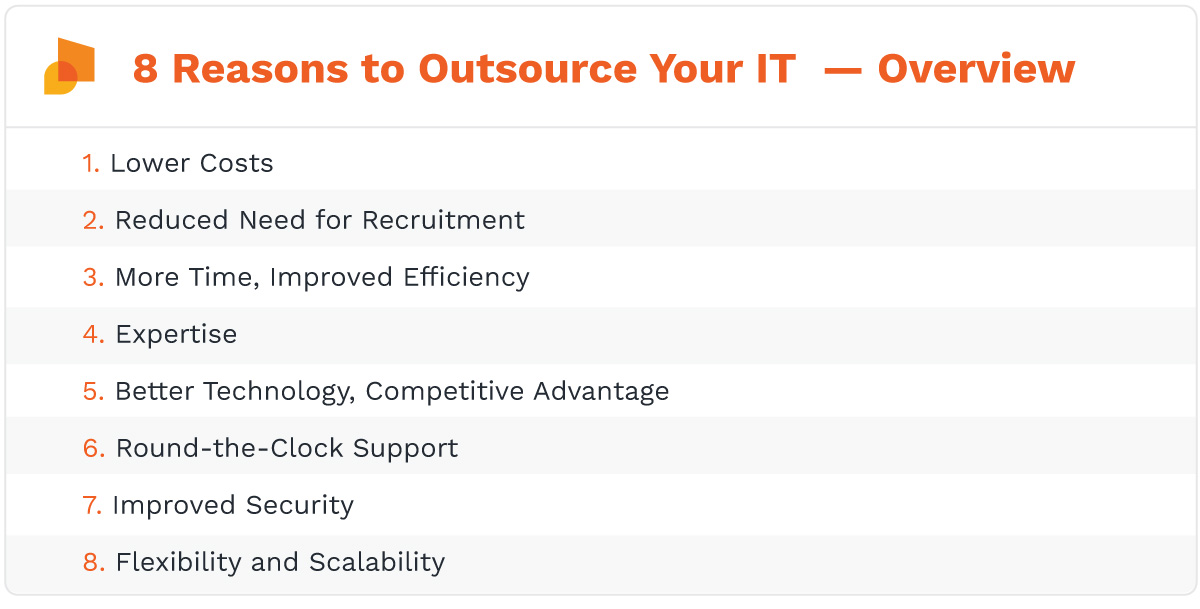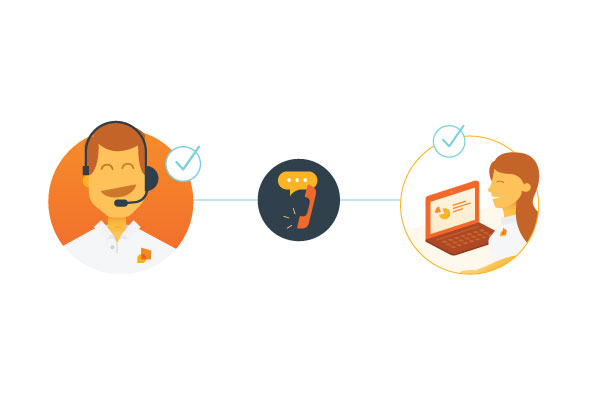Outsourcing information technology (IT) through managed services has become one of the most efficient ways for businesses of any size to streamline core tasks. By removing the mundane (and time-consuming) responsibilities, you give your internal team more space to work on specialized projects that target both your employees and customers.
If you’re new to all this or you're still on the fence, check out the benefits of outsourcing.

Lower Costs
Outsourcing may have become more affordable over the years, but that doesn’t mean you won’t balk at the initial price. However, you can't let that lump sum fool you either. When you factor in all the business functions you're getting, the cost savings is undeniable.
Labor Costs
Think of all the labor costs overhead cutting into your bottom line every month. These are payroll costs. Insurance. Taxes. Benefits. On the other hand, consider the costs of outsourcing your network engineers. You’re only paying the service provider’s fee—nothing else. You don’t have to worry about unexpected HR complaints, unemployment claims, or a sudden employee departure.
When you choose outsourcing providers, your balance sheet is the same month after month. This can make it easier to budget for the rest of your departments. You’re essentially providing your business with a team of technicians for less than the price of one in-house engineer.
Equipment Costs
The same cost predictability is also true of your equipment. When your server breaks, you likely pay someone to come in and repair it. When you outsource your network management, the costs to repair and maintain everything is built into the package. When you move away from this traditional break-fix strategy, business owners can manage the budget without having to build in as much of a cushion for unexpected events.
Plus, your service partner has an incentive to maintain equipment. The more they prevent breakage and downtime, the less it eats into their own bottom line. It's a win-win IT strategy that increases your functionality without bumping up the price.
When you lower your personnel and maintenance costs before they even have a chance to manifest, you reinforce a proactive approach rather than a reactive approach.
Reduced Need for Recruitment
The cost of hiring an employee varies based on location, industry, and size of the organization, but recent studies put it anywhere between $4,000 to more than $7,600. It can also take well over a month before the position is even filled. Outsourcing contracts will eliminate the costs and wasted time that hiring new employees would bring.
Give Your HR Employees a Break
By simply outsourcing a team of IT specialists, businesses reduce their spending without disruption to daily operations. It can improve the morale for your HR team (or employees who handle HR in their ‘spare’ time).
Finding talent, interviewing them, checking backgrounds, negotiating salary, training: all of these tasks eat up a lot of time. Plus, once a new employee is on board, there’s no guarantee they’ll be worth all the hassle. When you choose outsourcing services, you give everyone more time to focus on service performance rather than administration.
More Time, Improved Efficiency
If you’re relying on a single engineer or CIO for your business’ network performance, consider just how nerve-racking it is when they unexpectedly need the day off. It’s impossible to plan for every contingency when you’re so dependent on one person. It means your business is always at risk of under-performing when these unforeseen complications pop up.
Now, consider the same scenarios when you have an outsourced IT team at your back. If a technician needs the day off, the service provider already has a ready team of engineers available to cover. This advantage also applies to technical troubleshooting. Should your own technicians encounter a new problem, outsourced teams will put their heads together and come up with solutions.
Fewer Distractions: The Promise of Uninterrupted Projects
MSPs are particularly beneficial for companies whose expertise lies outside the sphere of IT. Having to deal with IT tasks actually inhibits the tasks from being completed efficiently and consistently. Outsourcing allows your business to free up your employees’ time rather than having to put out fires every day.
It might be why a recent study found that more than one-third of small businesses (37%) outsource at least one business process. When owners don't have to worry as much about day-to-day operations, they have more time to strategize long-term growth and expansion of the company.
Managed IT experts know how to handle technological issues with the latest updates before anything goes awry. Most IT outsourcing will also offer innovative solutions that remotely manage and monitor your network. This means real-time updates for anything from patches to printer meter readings.
Simplified Processes, Higher Productivity
Quality MSPs can also devise custom solutions based on the analysis of your systems, process reviews, and broad-spectrum expertise. Organizations get real-time virus and spam filtering plus constant monitoring and endpoint management.
Your company will no longer have to rally and waste precious resources when there are complications with the system. Instead, they enjoy a completely proactive network that defends against breaches and prevents downtime before you even know about it.
Expertise
It takes an expert to break your systems down. Rather than buzzwords and jargon, MSPs are trained to create digestible analysis before brainstorming custom solutions. Organizations are often surprisingly delighted to find out what it really means to have access to such a wide pool of talented specialists.
If your in-house team can’t sufficiently cope up with an ongoing digital transformation or handle the emerging issues in your IT infrastructure, an MSP will be a huge help.
The Advantages of Specializing
Managed Service Providers focus on very specific parts of your organization. They’re equipped with the processes, infrastructure, and staff to handle some of the most complex threats to your IT systems. They also have first-hand experience and skills drawn from multiple disciplines.
MSP employees further improve their skill sets through continued education, certifications, and real-world projects. These are specialists that offer advice and expertise guaranteed to add to your business’ value proposition.
There’s no substitute for the expertise offered by outsourced technical support. These professionals are constantly shifting gears, working in different verticals, and handling new challenges posed by every task. This broad experience forms the backbone of an outsourced IT provider’s expertise, and means they’ll be capable of handling any new challenge you throw their way.
Why Hire Someone Who Doesn’t Know My Industry?
This is a common question, and a relatable one for many business owners. It may seem like in-house IT staff have the advantage because they know your industry.
But the reality is that a managed IT partner has a large team of IT experts with specialized skills. Security management is different from network management, and leaving everything to just one or two people likely means there are serious gaps in your systems and programs.
Your in-house team doesn’t have to be stretched so thin when they partner with managed IT services. Doing so will increase their bandwidth and help you scale your tech alongside the growth of the company.
Access to Professional VCIO Services
Virtual CIOs can offer valuable insight into your company's IT systems. This can help you cut through the clutter in a variety of ways. Their experience gives you easier ways to analyze your current IT system, weigh it against what you still need, and develop custom solutions for the obstacles that stand in the way.
 These experts offer consultation services for your IT strategy as a third party. A VCIO will preside over your entire IT infrastructure, making sure that all components of your organization's network are working smoothly.
These experts offer consultation services for your IT strategy as a third party. A VCIO will preside over your entire IT infrastructure, making sure that all components of your organization's network are working smoothly.
This has been particularly useful for companies that face budget constraints in the midst of a much-needed digital transformation. A VCIO steps in as an effective and affordable tool so new IT solutions can be implemented and sustained.
Better Technology, Competitive Advantage
Today’s enterprise tools can be great for small businesses, but they’re also usually built for larger companies in mind. Many companies are only using a tiny portion of what the technology was created to do.
When working with outsourced partners, your business has access to enterprise-level tools at a fraction of the cost. You can achieve big gains in efficiency without the heavy spending that normally comes with it. Considering the rate at which technology evolves (and how costly it is to upgrade your systems), this is another cost advantage to outsourcing your processes.
And even if you aren’t keeping up with all the latest technology, you can rest assured that your IT partner is. Your team can worry less about new technology so they can concentrate on their own specialties. You can ask your IT managed service experts for recommendations, or they’ll come to you with suggestions on the best ways to innovate and automate your office. Choosing the best technology for an individual enterprise can be a daunting challenge, but managed providers are able to make these decisions based on everything from size to capabilities.
Technology these days is quickly pushing past the $1 trillion mark in the US. It’s clear that competing in today’s business world means having the right partner by your side.
The Crux of Core Tasks
Managed IT services providers help your team focus on core tasks and give you another team of specialists at the ready. It puts you in a prime position to skyrocket in your sector. This is a critical point that not every organization always takes into account.
If your IT infrastructure is running smoothly, you might think that you have everything under control. What you might not be seeing though is that much of the effort is going toward running the systems, as opposed to building out better functionality aligned with your business goals. It looks efficient from the outside, but the reality is that your organization may be underperforming.
Ensure Compliance with Laws
Part of keeping your competitive advantage means protecting your customers according to your industry’s regulations. To avoid fines and penalties from ever-changing compliance laws, an MSP can provide truly priceless help.
Managed Service Providers offer the latest in software, hardware, and technologies. They have up-to-date firewalls and advanced antivirus programs. They’ve implemented required security standards for their services, which means that you’ve implemented the required security services too. You won’t have to worry about maintaining client data privacy because the MSP will have it all taken care of.
Round-the-Clock Support
Managed IT providers schedule their team’s time so they’re available when you need them. So even if your employees are in different time zones, you always have an IT department on hand.
Continuous monitoring of your IT system is the best way to detect abnormalities. It makes it possible to spot a potential issue and take action to prevent a disaster. Most companies don’t have the capabilities to ensure 24/7 real-time monitoring of their IT systems. By the time a breach is detected, it’s too late to abate the worst of the damage.
When you outsource your IT, someone is always going to answer your call if there's a problem. Those network outages or service disruptions won't be quite so devastating when you have people you can count on. The best part: Waiting for an answer from offline support will become a thing of the past.
No More Downtime
Constant monitoring is also a defense against downtime, one of the most significant barriers to the growth of a small business. When you outsource your IT support, you get consistent activity reports that display anything from gaps in network security to threats that have been eradicated.

This active management ensures that your data and networks are secure, reducing the chances of network downtimes that interfere with productivity and morale. Having an MSP that proactively prepares for breaches and other adverse events is a cost-saving strategy that contributes to business growth in the long run.
Plus, when you include data center backup and recovery services from your managed IT partner, you have the tools to handle even the most serious problems. From natural disasters to successful hackers, you can get back up and running faster than you might think. Your managed IT partner can provide redundant systems to keep your network functioning 24/7/365.
Continuous Updates: A Proactive Approach
Recovering from a disastrous breach can be hectic, and it usually takes a lot to get the systems back up and running. If the IT systems have to be unavailable for extended durations, the consequences may be dire. In the worst-case scenario, this may lead to closure of the business altogether.
To avoid any potential shutdowns and outages during working hours, it’s important to keep IT systems updated at all times. Managed Service Providers maximize uptime by performing regular updates in the evenings or on weekends.
Trying to do this with an in-house IT team often leads to overtime expenses and work creep that disrupts normal business hours. With managed IT support, your system availability will be enhanced without disrupting your employees during their workdays.
Improved Security
In the past year, 41% of businesses were hit with phishing attacks targeting employee tax records — and that was just in Q1 alone. Since the onset of the COVID-19 pandemic, data breach cases have risen to an all-time high. In this day and age, the fallout from these breaches isn’t an urban legend: it’s happening in your backyard.
Plus, threats today are evolving at a rate that few could have predicted. Spotting the latest tactics and developing the right solutions takes a significant amount of expertise. More than that though, it takes a lot of time and effort to stay on top of it all. If you have an in-house team, you have to foot the training costs and educate employees, which may balloon your IT budget.
Vigilance You Can Trust
Cybercriminals are devising more complex ways to penetrate your company's private data and prey on online traffic. It takes a dedicated expert to configure solutions that ensure network security is impenetrable. Your in-house team likely doesn’t have that kind of bandwidth.
Making sure data stays secure is quite possibly your greatest concern as a business owner. MSPs offer all the software and support required to keep your IT systems safe. Outsourcing your IT support to a managed service provider decreases the risk of a security breach that could paralyze your business.
Taking all necessary precautions to improve your IT security is critical to the long-term success of your employees, customers, and overall business. The continuous, proactive monitoring of your network from a managed provider keeps attempted hacks at bay. You don't have to worry about applying and testing security patches or installing/updating the latest virus and malware protection. You can leave all that to an outsourcing company.
Flexibility and Scalability
We mentioned scalability above, but it’s worth highlighting with our last advantage. When you grow with managed service providers, you can upgrade your IT infrastructure with a single phone call. Need more storage? Add some quickly. Want to adjust your backup frequency? No need to involve your IT staff because someone else can take care of it for you. Want to check out those cloud services you keep hearing about? Give your outsourced IT operations a call.
Staying On Top of Emerging Demands
Technology grows exponentially, and it makes adapting to changes a major challenge for many businesses. An MSP helps your business keep up with the changing IT landscape quickly. You can take advantage of the ever-changing landscapes because your systems are equipped for the advancements. MSPs have the resources and staff to implement new functionalities quickly. A project that would take your in-house team months to develop and deploy might take an MSP several nights. These companies bring in years of experience providing support, saving time, and money in deploying new technology.
Your underlying IT infrastructure is also easily expandable. So if you become more interested in automation, advanced software development, or better telecommunications somewhere down the line, it will be easier to make it happen. Outsourcing is not a short-term fix, it’s a forward-thinking strategy that paves the way to success.
Easier Transitions: Work from Anywhere
The sudden need to have employees work from home during the pandemic saw many companies shut down. Others struggled with installing IT systems that allowed their employees to work from home. By contrast, those that turned to MSPs for help benefitted from an effortless and affordable transition.
In many ways, MSPs have provided companies with a lifeline. By offering critical tools for collaboration, MSPs ensure cloud, security, and reporting tools could help businesses remain afloat during a crisis. They played an important role both during the transition to and in operational support after the transition.
Some common issues that MSPs solve to make the transition smooth include:
- Remote network access
- Security
- Cloud support
- Conferencing and collaboration solutions
A good MSP knows that it’s impossible to plan for everything. At the same time, they also know the value of being able to pivot. Instead of locking themselves into any given system, they built protocols and policies that allow for the unexpected. It gives owners true peace of mind when the news hits the headlines.
Key Takeaways
Standard IT services aren’t a competitive advantage anymore — everyone has a network and a backup protocol these days. The IT skills needed to implement and manage these systems are increasingly becoming a serious commodity, and this is true no matter what industry you’re in.
Your business is better served by outsourcing non-core tasks and focusing internal IT resources on projects that will differentiate you from your competition. Whether that’s a better website, improved customer service automation, or faster invoicing and internal workflows, your team will have more energy to devote to both your employees and clients.
Keep this in mind the next time you're deciding between hiring or outsourcing. Ask yourself ‘Would our resources be better spent on expanding our core capability?’ The answer will tell you if outsourcing is right for you.
Categories: Security, Managed Services, Strategy, IT Outsourcing, Managed IT Services, IT Management, MSP











